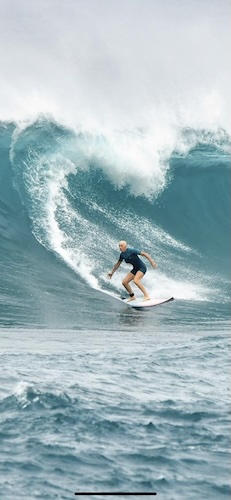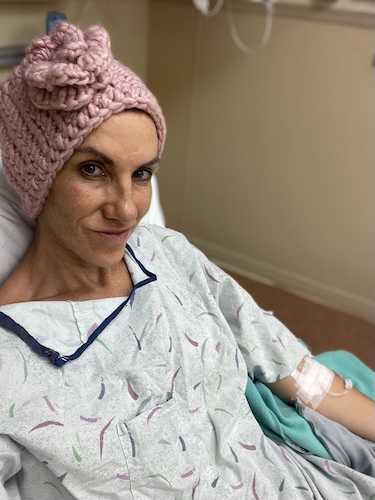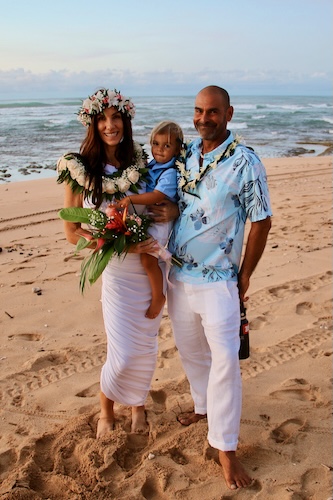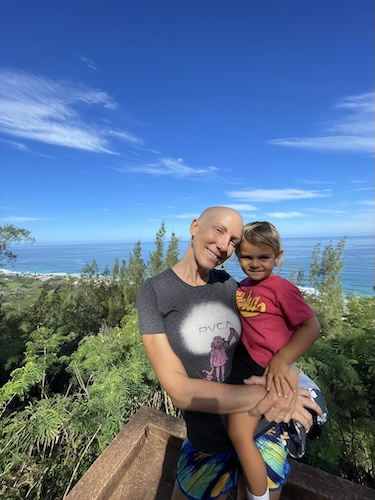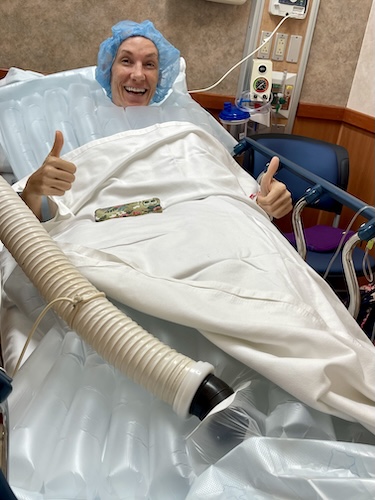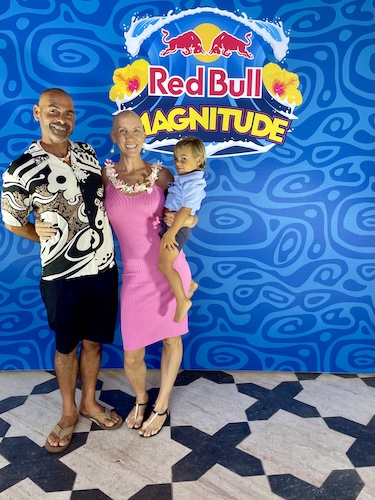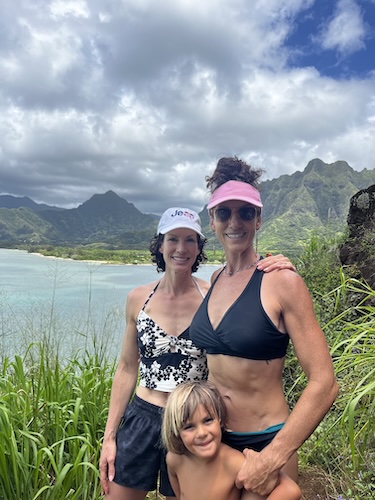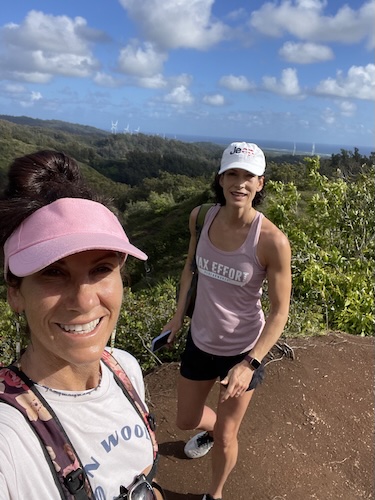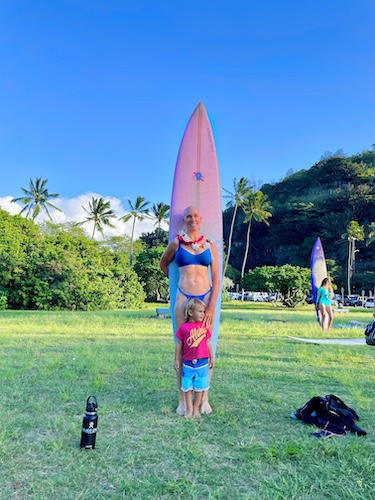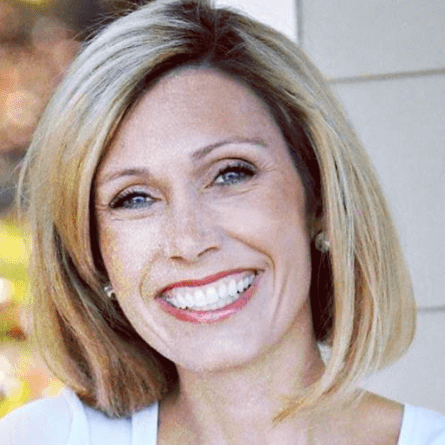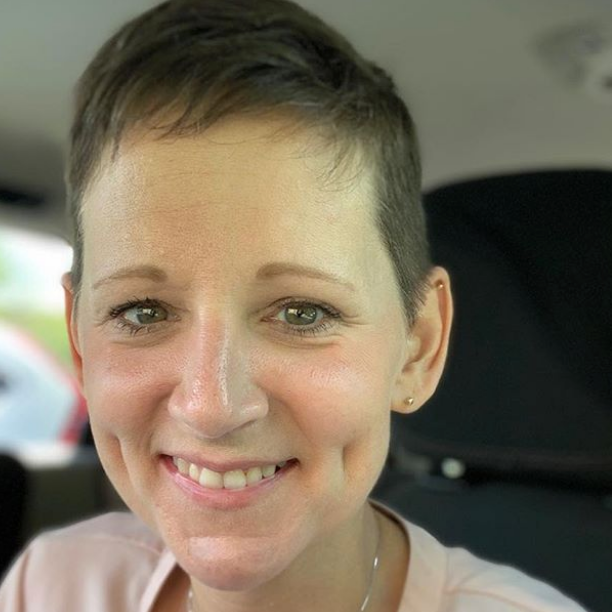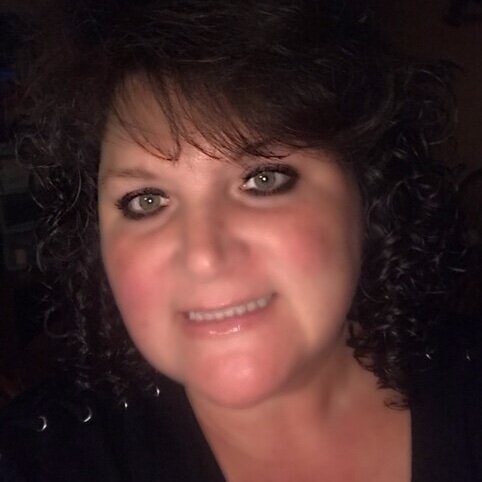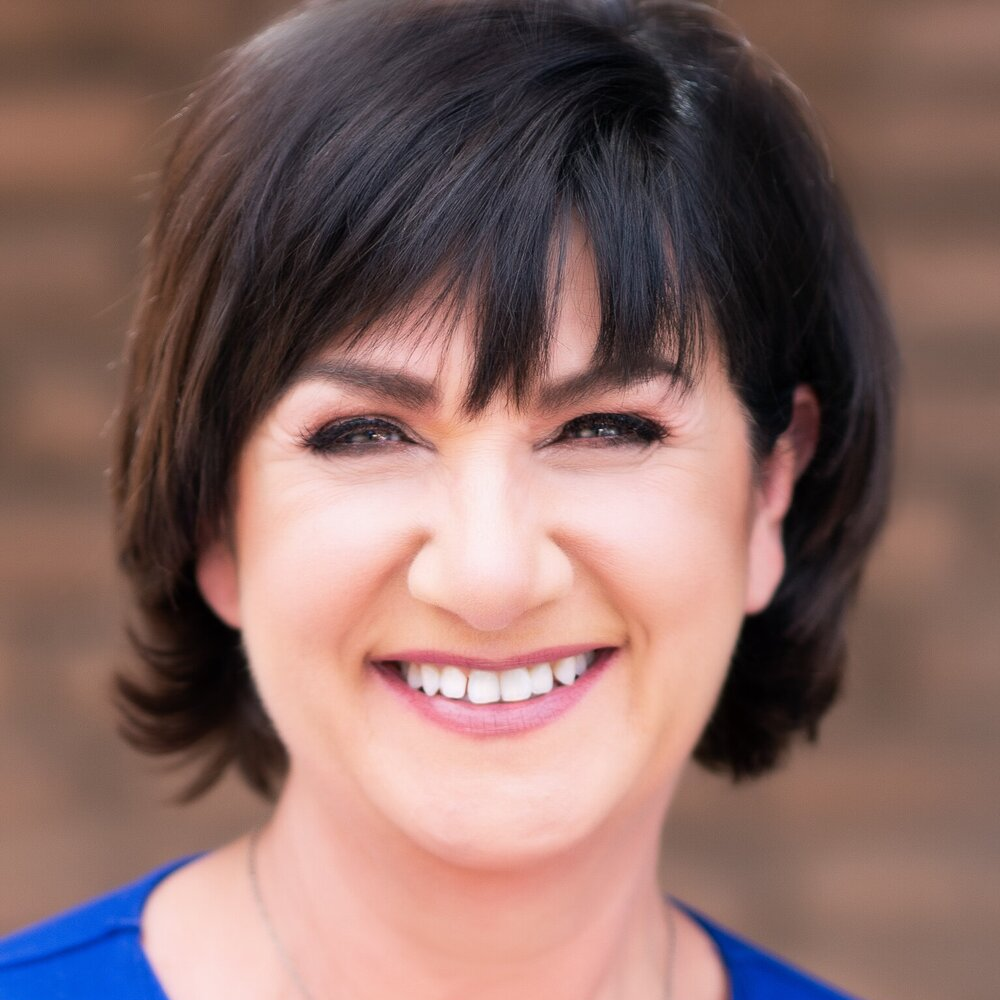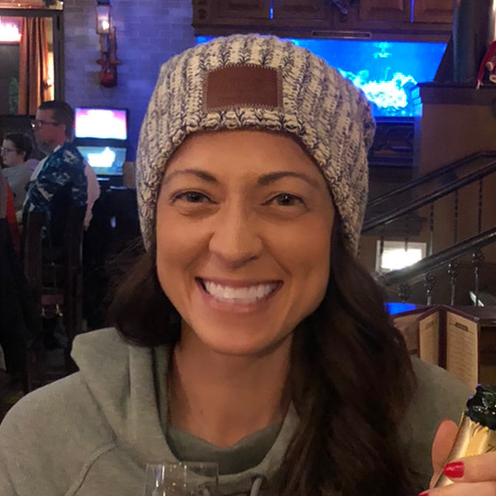“Panic Only When Your Feet Hit the Sand”: Melanie’s Stage 4 High-Grade Serous Ovarian Cancer Story
Melanie was diagnosed with stage 4 ovarian cancer in the fall of 2022, and she speaks about the many ways her life has shifted since then in Hawaii, where surfing, yoga, and family once defined her day. Melanie shares openly how her relationship with her son Velzy became a lifeline. Instead of clinging to fear, she leaned into self-improvement and gratitude.
Interviewed by: Nikki Murphy
Edited by: Chris Sanchez
From the start, Melanie’s positive mental outlook shaped her approach to living with ovarian cancer. She acknowledged her BRCA1 mutation and the reality that screenings don’t always catch the disease early. When symptoms like abdominal swelling, stabbing side pain, and a persistent cough appeared, she confronted them head-on, taking ownership of her health by researching, seeking testing, and ultimately listening to her intuition. Even when the diagnosis confirmed stage 4, she faced it with calm focus, reminding herself of the same mantra she used while big wave surfing: “panic only when your feet hit the sand.”
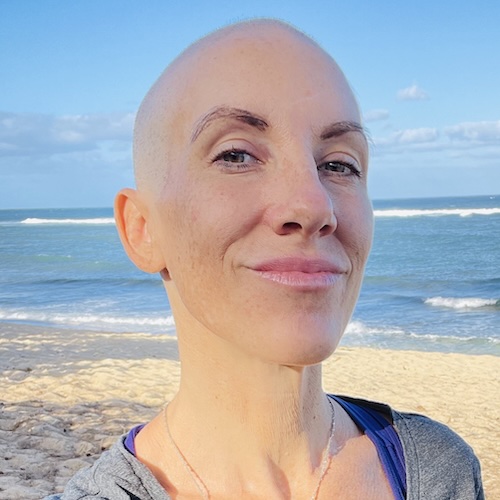
The emotional work has been as important to her as physical treatment. Melanie describes feeling a surprising calm after reading survival statistics, and even excitement as she realized the possibilities for self-improvement. Even when her marriage ended, she embraced the opportunity to be more present for her son and to live more authentically. Letting go of conventional “hope” gave her the freedom to experience what each day offers without carrying the weight of future expectations.
Melanie’s advocacy is clear and empowering. She encourages others to filter outside noise and trust their medical teams, while also drawing boundaries that protect mental health. She is open about both the difficulty and the blessings of ovarian cancer: from surgical menopause and physical loss to the deeper healing of self-awareness and renewed love for her son. Each treatment cycle, each surf session, and each mindful moment all reflect her commitment to owning her experience: her health, her choices, and her life.
Watch Melanie’s video and scroll down to read the transcript of her interview. You’ll learn more about:
- The unexpected comfort she found when she refocused on her relationship with her young son
- How surfing mantras helped Melanie face stage 4 ovarian cancer with calm
- The moment she recognized that she had all twelve symptoms of ovarian cancer
- Why setting boundaries became a life-saving act of self-care
- Name: Melanie E.
- Diagnosis:
- High-Grade Serous Ovarian Cancer
- Staging:
- Stage 4
- Mutation:
- BRCA1
- Symptoms:
- Cough
- Stabbing pain in right rib area
- Bloating
- Frequent urination
- Moodiness
- Fatigue
- Treatments:
- Surgery: debulking surgery including full hysterectomy
- Chemotherapy
- Immunotherapy
This interview has been edited for clarity and length. This is not medical advice. Please consult with your healthcare provider to make informed treatment decisions.
The views and opinions expressed in this interview do not necessarily reflect those of The Patient Story.
- I'm Melanie
- I did genetic testing when I was a teenager
- What happened next
- The moment everything changed
- I had to change my mindset quickly
- My treatment plan
- I asked my doctor if we could skip the hysterectomy
- The plan moving forward
- I’m open to clinical trials
- The biggest challenge I’ve faced during my diagnosis
- What parenting looks like with cancer
- My advice to others
I’m Melanie
I’m from Hawaii. I have stage 4 ovarian cancer. And I was first diagnosed in the fall of 2022.
I did genetic testing when I was a teenager
I knew that I carried the genetic mutation BRCA1. It’s a genetic mutation that a lot of women have that puts them at high risk for breast and ovarian cancer. I knew this because of my family history. I had gotten tested because I knew my dad was positive for it. I got tested in 2014.
I had biannual screenings for both breast and ovarian cancer in March 2020. Everything was fine. However, my oncologist at the time had explained to me that the screenings that we were doing for ovarian cancer were like wearing your seatbelt in an airplane crash. Would they be helpful? Maybe. But the likelihood of them actually catching something early enough would not be very good.
A couple of months after that, I noticed a stabbing pain in my lower right side. I thought maybe it was appendicitis. And I just took a bunch of garlic. I’m a yogi, an all-natural type of girl. So I thought, “Oh, you know, if I have a slight infection in my appendix, I’ll just take the garlic.” And it actually did go away. Then I developed a dry cough, and I also got COVID within weeks of developing the cough, so I just thought it was probably lingering COVID symptoms.
At the time, my husband, my son Velzy, and I were on a surf trip. We were traveling in Central America — Nicaragua, Costa Rica. And around the last couple of weeks of our trip, my abdomen started swelling up. I would eat something that would normally give me a little bit of gas, like, say, beans, which are, of course, very common in Central America. But it wouldn’t be a little bit of gas; it would be excruciating. And I started eating less and less, and I noticed that my weight was dropping. But my abdomen remained distended most of the time. I thought that maybe I had a parasite. I also thought I could be pregnant; my hormones seemed crazy. I was nauseous too. I was reacting to situations in ways that I wouldn’t normally do. So I took a pregnancy test and found out that I wasn’t pregnant, because my cycle was weird too. So next, I thought I’d go on a parasite detox, because the likelihood that I had picked up a parasite in Central America was pretty high.
So, all that was going on, but in the back of my mind, I was also considering that I was genetically predisposed to ovarian cancer. So a few days before we were scheduled to return to Hawaii, I Googled the symptoms of ovarian cancer, and a list of twelve symptoms came up. I had every single one of them.
That’s when I had to just take a deep breath and go see the doctor.
What happened next
I made an appointment right away to see my oncologist and get testing done in Hawaii. The medical system is slow, and there was a week’s delay before I could get any testing done, so it was a long week of using my yoga practice of just trying to stay in the moment, trying to feel the sensation of fear in my body, trying not to let my thoughts spin out of control. Because I actually there was nothing more I could do until then. I had done my due diligence. After I made the appointment, everything else was out of my control.
I had a pelvic ultrasound. I remember the ultrasound tech seeming nervous within minutes of putting the gel on my belly, and she went, “I’m going to go get the doctor.” So she came back in with the doctor, and the doctor said that she would be sending the images to my oncologist and that she thought it was related to my BRCA1 mutation. That afternoon, I had a blood test, and my oncologist’s office called me and said that they needed to see me in person the next morning. And so that’s when I was like, “Okay. Here we go.”
The moment everything changed
The ovarian cancer blood marker test is called CA-125. That evening, after getting the ultrasound and the CA-125, I was able to open the MyChart portal. I saw that the blood markers were ten times higher than normal. So I kind of knew right then.
The next morning, I called my friend to come with me to the oncologist. Since that was still the time of the pandemic, I couldn’t bring my son with me to the doctor, and my husband stayed home with my son. The gynecologist was saying, “This is what we think it is.” We didn’t have anything concrete yet at the time; no biopsy had been done, but he had done the exam, and he had felt nodules. And he had seen hundreds of cases like. mine.
I was grateful for the way that he said it. But I was also thankful for the fact that my friend said, “Just tell us.” He said, “We think this is ovarian cancer. We think it’s in your lungs, too, because of your cough and your other symptoms, the pleural involvement. So it’s most likely stage 3 or 4.”
In that moment, I was pretty calm. You know, nobody’s completely calm when they hear cancer. That’s a heavy word. But because of my background in surfing, I’ve trained myself to stay calm in very scary situations. There’s a mantra I use in surfing. “You can panic when your feet hit the sand.” It’s good to feel all of those emotions, but not right now, not in the moment.
So I took deep breaths and tried to remember everything he was telling me. And then my friend and I walked outside the hospital. That’s when we just melted down together.
I didn’t tell anybody except for my parents at the time because I was scheduled for surgery two days later, as well as a CT. We wanted a surgery because in Hawaii, it was impossible to get me in for a biopsy, but it was much easier for the doctor to schedule a laparotomy. This would involve him sticking a scope in to see what was going on, as well as taking biopsies at the same time. It’s just the way the medical system is here — things can be a little bit slow, a little bit turned around. So I was so grateful that he did that.
Days later, we got the official biopsy results. And then I officially knew what type of ovarian cancer I had, what stage, and what grade, and all of that. And it didn’t come as a surprise at that point.
I had to change my mindset quickly
Perhaps my experience is similar to others’, but it may also be different for various reasons. Many conflicting things were happening. Obviously, there was terror. I remember opening the MyChart portal and seeing what was there.
My immediate reaction was like, “Let’s start juggling this. What’s the prognosis?” Blah, blah, blah. And then I just sat there, and I was like, “Take a moment. Feel this.” I remember feeling scared and out of control, and grasping at control. But I also remember this growing sense of curiosity and even excitement.
I’ve been through two major health challenges before this one. The first was an eating disorder, and the second was an injury that kept me mostly in bed for months. Though both of those things changed my life for the better in enforceable ways, and I would not go back to how I was before them. If I had the choice to not have that eating disorder or that injury, I wouldn’t choose to because they happened for the highest good. I’m happy with who I became and what I learned through them.
So when I saw that I had metastatic cancer, for which the five-year survival rate was 17%, I thought, “Game on.” I’m about to go through the hardest thing I’ve ever been through, and I just had this peace that it was going to be for my highest good — even if I didn’t survive it. I felt that something was going to come out of this, whether for me or for my family, for my child, for my parents and my siblings, or for the world in general. That good could not have come had I not had cancer.
I don’t want anyone hearing this to feel like they should feel that way, too, or that it’s some kind of spiritual bypassing. There was terror, and even talking about it now, I’m very emotional. like you know. I just had this peace and knowledge that came from another place that this was going to be for my highest good.
And I was excited. I’ve always loved a challenge. That’s just the type of person that I am. So, yeah, looking at those results in black and white, I felt like it was another big wave to surf.
My treatment plan
Right away, my doctor talked to me about the standard of care. He said, “You’re going to need neoadjuvant chemotherapy, four rounds of chemo. Then a surgery, then four more rounds of chemo.”
He also went through the likelihood of the response rate. He said I was likely to respond, which is so interesting because I didn’t understand the difference between response rate and five-year survival rate. So he explained to me, “We’re really good at putting this kind of cancer into remission. We’re just not really good at curing it.” Yeah, I was hesitant. I mean, I didn’t take aspirin before this if I could help it. I didn’t take antibiotics. I always treated myself with alternatives, Chinese herbs, and things like that.
But in this case, I was able to decide quickly. The doctor said, “You know what, this is stage 4, this is very serious. We don’t have time to mess around here.” He told me that the doubling time of ovarian cancer is twenty-eight days, and so they’re really wasn’t a lot of time for hesitation.
Initially, I thought, “Oh, do I really want to do this?” But within a few minutes, I decided. “We’re doing this.” I felt comfortable with my doctor. I really loved him. So I went ahead and did my first chemo there as well as the surgery.
I asked my doctor many times if it would be possible to do my debulking surgery laparoscopically, since I didn’t want to be split open top to bottom, given that I am an athlete, and that’s an important part of my life. He did a wonderful job; my recovery was much easier than I thought it would be.
However, the cancer came back months later. I was hesitant to do my chemo again in Hawaii, not necessarily because of the medical system, although I did want a second opinion because of the second occurrence of cancer. The more the treatments begin to branch off, the first line is always the same, and the second line is very similar. But then, with the third and the fourth, things get more complicated. And the biggest thing was the lack of support. I don’t have any family here, and through all of this, my husband and I struggled to find a rhythm together and also struggled financially. So I decided for my second line to go to the mainland and live with my family in Michigan, where there’s very good medical care. They call it the medical mile. I do feel like, at some point, as far as the availability of clinical trials and doctors who are researching the cutting-edge treatments, there are definitely more on the mainland.
I asked my doctor if we could skip the hysterectomy
I didn’t want menopause. And I also love the rhythm that my cycle puts into my life and the way that I’ve organized the flow of my month around my cycle. I was afraid that I would lose some sort of femininity if I had a hysterectomy. I was also afraid of being cut open and the recovery time, since I was surfing; after a surgery like that, you can’t lift more than five pounds for 12 weeks. I thought that I might not recover to 95% of my old level or even 50% of it. I was really afraid.
I went on a Facebook group for women with ovarian cancer, and one part of my body that I have always loved is my abdomen. And I asked if anyone was willing to share their photos of their surgery scars. I was so blown away by these women. Some were elderly, but some weren’t — they might even have been Instagram models in great shape, and proud of their scars up and down their abdominal areas. They were so proud of what their bodies endured and how their bodies showed up for them and helped them to move on.
So I was so much more comfortable with what was about to happen. But I still begged my doctor to do the operation laparoscopically, and he obliged me.
I remember that day, me going into surgery and saying goodbye to my best friend, who held my hand right until I went in the door. And I was terrified when I was about to be put under. Of course, I fell asleep within seconds. When I woke up, I was already in my recovery room, where I saw that there was a bassinet and signs on the wall about breastfeeding positions. I was in a labor and delivery room. A nurse came in and I asked her about it, and she said, “This is where we put all the people with the lady bits.” And I said, “But I don’t have lady bits anymore.”
I was devastated and still am today, every time I see a mom with a baby. But at the same time, I’m relieved. My child was so much work. Giving birth was so brutal. And now, I don’t have to go through that again. There are other options for children.
That being said, I will never grow a child inside myself again. I will never give birth again. I will never breastfeed again. And those are losses. Those are big losses.
The plan moving forward
I’m on an oral chemo medication, a PARP inhibitor. It didn’t seem to be doing its job, so we added Avastin, a medication that stops blood vessels from forming and basically makes the cancer more susceptible. Unfortunately, it also makes my whole body more susceptible to the other oral Chemo. So I get an infusion every three weeks and take oral chemo every day.
Right now, I’m stable. I just had a CT scan this weekend, and nothing has progressed in the last three months. So the treatment that I am on is at least keeping me stable, and I honestly feel pretty good on it.
I’m not where I would be if I didn’t have cancer and wasn’t on any treatment. But I still surf and work out daily. I teach yoga. I do massage therapy. I keep up with my son. It’s a lot, and most of the time, I have the energy for it. Of course, there are things like migraines, constipation, neuropathy — all of these things that come along with chemo, but maybe they’ve just become part of my life.
I’m open to clinical trials
At this point, since my cancer is stable, I don’t have to make that decision. But somewhere down the road. It will be decision time. And if I have to make that decision. I will need to leave.
There is an option with some of these trials. There are really good trials in California, and the flight to California is quite easy, and it would be like a once every three weeks type of thing.
And when you get a diagnosis like cancer, you notice the benevolence of humanity. So many friends have come out of the woodwork and have told me things like, “You can have my place. You can have my car. I will help you with airfare.” So if it comes to that, I’m prepared to make that call or go back to Michigan and be with my family in the end. I know that if we ever get to the point that treatment stops working, I would end up in Michigan with my family.
There definitely are options, and they’re on my radar.
The biggest challenge I’ve faced during my diagnosis
My marriage has actually been the hardest thing. After my first line of treatment, it wasn’t anything new. It happened when my son was a child. My husband has a mental illness and didn’t have the capacity to show up to be the father and the husband that I needed him to be with a child. That was that much work. And I guess a part of me really hoped that a diagnosis of terminal cancer would be enough to shake him and get him off the couch, and it wasn’t.
When my cancer came back for the second time, I had already agreed to myself that if my cancer returned, I would not do chemo with him as my main support system. I would need to go to Michigan and be with my family. Which is a big decision, given that surfing is a giant part of my life and being outdoors and all of that.
So when the cancer did come back, along with many other feelings, I felt relief. Because I finally had a reason big enough to leave him. And after treatment, we separated.
Honestly, drawing boundaries and not being codependent have been the biggest lessons of cancer. And that is how I have changed the most. And I honestly feel that menopause has been such a blessing. Talk to any woman who has gone through menopause, and she might tell you that one of the things that she notices is that people pleasing is reduced greatly. This has been the spiritual work for me.
I believe this is cancer came to me to level me up and help me to grow the spine that I needed to protect my energy. So that I am nourishing myself and nourishing my son and not nourishing people who have the capacity to nourish themselves. And so that is the biggest change.
What parenting looks like with cancer
My son just started kindergarten, and it is a breath of fresh air. But until that time, honestly, I relied on caffeine a lot, because he would drive me out of bed way before I was ready to get up, and I generally go to sleep with him at 8 pm, and by 6 am, I’m a rise and shine mom. But I could use 12 hours of sleep a day easily, and even more when I was taking chemo infusions. So we always napped together when he was still taking naps.
I did pay a lot of babysitters. I did have to humble myself and ask a lot of friends and neighbors. “Can you just take him for an hour?” And that was really hard because a lot of times, I was asking a neighbor for help while my husband was available to help, but not willing.”
Now that he’s in school. I have those six hours to spare for what I need to do to make my house feel like a nice place. So I can relax, meditate, lie down, and close my eyes for twenty minutes. So that when he comes home, I am fully his and I am present with him. I still have to have afternoon caffeine to get me through like that.
But the biggest thing that’s changed with parenting is how much I appreciate the gift of being able to parent. Lying in bed with him at night should take him like an hour to fall asleep, and I would want him to sleep right away so I could have some me time. Now, when that happens, I can’t say I don’t feel that. But I catch myself and I go, “Melanie. This is amazing, you are playing in bed with this little thing that loves you so much. Can you just let your chest rise and fall with his?”
It’s so much easier now to just show in those moments and appreciate sitting on the floor with my back hurting, playing with Legos. I can actually really love and appreciate that in a way that I never could have if it hadn’t been for the diagnosis.
My advice to others
The answer can be a blessing, at the same time as being the most awful thing. It has been for me. It’s changed me. It’s shaped me. It showed me the goodness of humanity. I have stronger relationships. I love my body more than I ever have. I appreciate my son more than I ever have. My anxiety is all but gone. I am a better person for having had cancer and having been treated for it. Honestly, it has never been worse than being pregnant.
This is my experience. It doesn’t have to be brutal. There are moments, of course, that it is brutal, and other moments when it’s just not a big deal.
And so I would want anybody who is newly diagnosed or worried about a diagnosis to just know that it doesn’t have to be awful. And that you can do it. And that it has hidden blessings as well.

Inspired by Melanie's story?
Share your story, too!
More High-Grade Serous Ovarian Cancer Stories
Randalynn V., High-Grade Serous Carcinoma, Stage 1C
Symptoms: Pulling sensation when emptying bladder; abdominal pain
Treatments: Chemotherapy (carboplatin & paclitaxel), surgery
...
Shirley P., High-Grade Serous Carcinoma, Stage 3C, BRCA1+
Symptoms: Pulling sensation when emptying bladder; abdominal pain
Treatments: Chemotherapy (carboplatin & paclitaxel), de-bulking surgery, PARP inhibitors
...
Suzann B., High-Grade Serous Carcinoma, Stage 3C, BRCA1+
Symptoms: Inability to urinate
Treatments: Chemotherapy, de-bulking surgery, total hysterectomy
...
Susan R., High-Grade Serous Ovarian Cancer, Stage 4
Symptoms: Pulling sensation when emptying bladder, abdominal pain
Treatments: Chemotherapy (carboplatin & paclitaxel), surgery
...
Sara I., High-Grade Serous & Clear Cell Carcinoma, Stage 3A
Symptoms: Random sharp pains, unrelated scan showed ovarian cyst
Treatments: Debulking surgery, chemotherapy (carboplatin & paclitaxel), PARP inhibitors (clinical trial)
...
